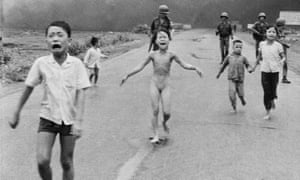Hansen v Zuckerberg
Oh, Zuckerberg.
The Guardian headline: Mark Zuckerberg accused of abusing power after Facebook deletes ‘napalm girl’ post
Yes that sounds like Facebook. Remember the time there was that group posting photos of an allegedly gay man being burned alive, and Facebook kept telling us (and many others) it didn’t violate Facebook’s community standards? But it’s well known that photos of women nursing infants do violate those standards.
Julia Carrie Wong in San Francisco reports:
Norway’s largest newspaper has published a front-page open letter to Facebook CEO Mark Zuckerberg, lambasting the company’s decision to censor a historic photograph of the Vietnam war and calling on Zuckerberg to recognize and live up to his role as “the world’s most powerful editor”.
Espen Egil Hansen, the editor-in-chief and CEO of Aftenposten, accused Zuckerberg of thoughtlessly “abusing your power” over the social media site that has become a lynchpin of the distribution of news and information around the world, writing, “I am upset, disappointed – well, in fact even afraid – of what you are about to do to a mainstay of our democratic society.”
“I am worried that the world’s most important medium is limiting freedom instead of trying to extend it, and that this occasionally happens in an authoritarian way,” he added.
The controversy stems from Facebook’s decision to delete a post by Norwegian writer Tom Egeland that featured The Terror of War, a Pulitzer prize-winning photograph by Nick Ut that showed children – including the naked 9-year-old Kim Phúc – running away from a napalm attack during the Vietnam war. Egeland’s post discussed “seven photographs that changed the history of warfare” – a group to which the “napalm girl” image certainly belongs.
You know the photo of course.

Nick Ut/AP
But it gets worse.
Egeland was subsequently suspended from Facebook. When Aftenposten reported on the suspension – using the same photograph in its article, which was then shared on the publication’s Facebook page – the newspaper received a message from Facebook asking it to “either remove or pixelize” the photograph.
You know someone who gets suspended from Facebook regularly? Meaning often? Maryam, that’s who. Maryam Namazie, human rights activist.
In his open letter, Hansen points out that Facebook’s decision to delete the photograph reveals a troubling inability to “distinguish between child pornography and famous war photographs”, as well as an unwillingness to “allow[ing] space for good judgement”.
“Even though I am editor-in-chief of Norway’s largest newspaper, I have to realize that you are restricting my room for exercising my editorial responsibility,” he wrote. “I think you are abusing your power, and I find it hard to believe that you have thought it through thoroughly.”
Hansen goes on to argue that rather than fulfill its mission statement to “make the world more open and connected”, such editorial decisions “will simply promote stupidity and fail to bring human beings closer to each other”.
…
In his open letter, Hansen points out that the types of decision Facebook makes about what kind of content is promoted, tolerated, or banned – whether it makes those decisions algorithmically or not – are functionally editorial.
“The media have a responsibility to consider publication in every single case,” he wrote. “This right and duty, which all editors in the world have, should not be undermined by algorithms encoded in your office in California.”
“Editors cannot live with you, Mark, as a master editor.”
Speaking in Rome last month, Zuckerberg addressed the question of Facebook’s role in the news media and appeared to downplay his editorial responsibilities.
“We are a tech company, not a media company,” he said. “The world needs news companies, but also technology platforms, like what we do, and we take our role in this very seriously.”
Yes, Facebook is a platform, not a “media company” – it aggregates and shares content as opposed to creating it. But that’s still an editorial thing to do, and they do edit, so they need to edit well instead of badly.
